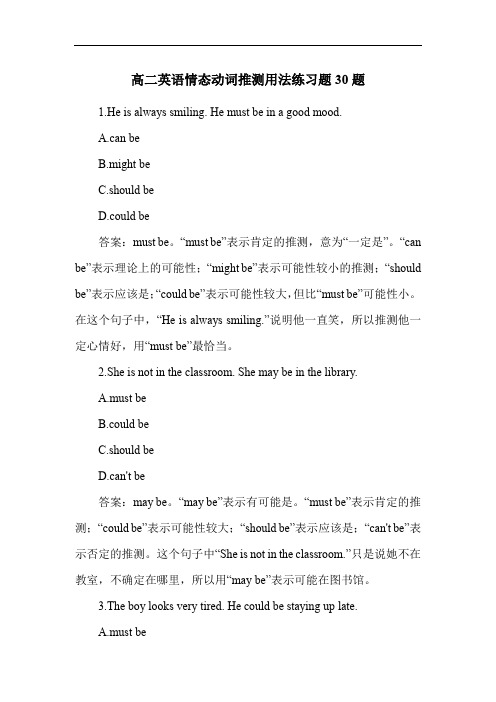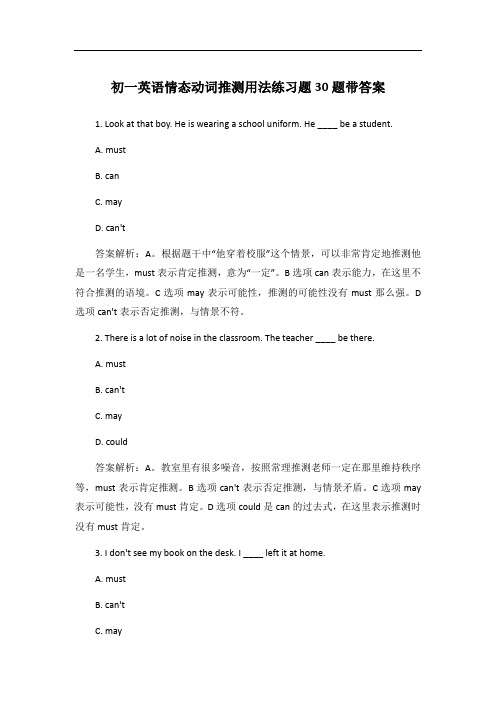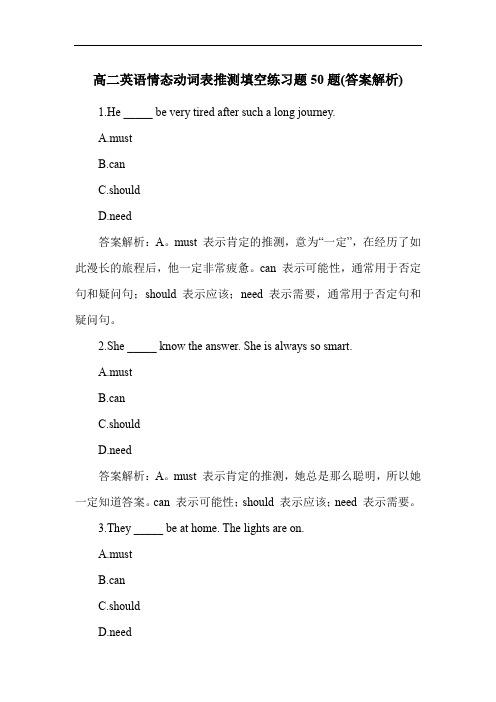情态动词表推测专项练习题
中考英语情态动词推测基础练习题40题(带答案)

中考英语情态动词推测基础练习题40题(带答案)1.There is a loud noise coming from the next room. It must be Tom. He is the only one there.A.must beB.can't beC.could beD.might be答案解析:A。
“must be”表示肯定的推测,根据题干中“There is a loud noise coming from the next room. He is the only one there.”可知,有很大的噪音从隔壁房间传来,并且他是那里唯一的一个人,所以可以肯定是汤姆。
“can't be”表示否定的推测,不符合题意;“could be”和“might be”表示可能性较小的推测,也不符合题意。
2.The book on the table isn't mine. It can't be mine.A.must beB.can't beC.could beD.might be答案解析:B。
“can't be”表示否定的推测,根据题干“The book on the table isn't mine.”可知,桌子上的书不是我的,所以用“can't be”。
“must be”表示肯定的推测,不符合题意;“could be”和“might be”表示可能性较小的推测,也不符合题意。
3.Look at that girl. She is singing so beautifully. She could be aprofessional singer.A.must beB.can't beC.could beD.might be答案解析:C。
“could be”表示可能性较大的推测,根据题干“Look at that girl. She is singing so beautifully.”可知,那个女孩唱歌很好听,有可能是专业歌手。
初一英语情态动词推测用法练习题30题(带答案)

初一英语情态动词推测用法练习题30题(带答案)1. The door is open. Someone ____ be in the room.A.mustB.canC.mayD.could答案解析:C。
“must”表示肯定的推测,语气非常强;“can”表示理论上的可能性;“may”表示有可能,语气较弱;“could”表示过去的可能性或委婉语气。
在这个场景中,门开着只能说明可能有人在房间,所以选择“may”。
2. There is a lot of noise coming from the classroom. The students ____ be having a discussion.A.mustB.canC.mayD.could答案解析:A。
“must”在这里表示比较肯定的推测,因为有很多噪音从教室传来,很有可能是学生们在进行讨论。
“can”和“could”表示可能性较小,“may”语气较弱。
3. Tom is not in the classroom. He ____ be in the library.A.mustB.canD.could答案解析:C。
“may”表示有可能,因为汤姆不在教室,只是有可能在图书馆,不能确定,所以选择“may”。
“must”语气太强,“can”和“could”也不太符合这个场景。
4. The light in the office is on. Someone ____ be working there.A.mustB.canC.mayD.could答案解析:C。
灯亮着只能说明有可能有人在办公室工作,“may”语气较弱,符合这个场景。
“must”太肯定,“can”和“could”也不太恰当。
5. There are some footprints on the ground. Someone ____ have walked here.A.mustB.canC.mayD.could答案解析:C。
高二英语情态动词推测用法练习题30题

高二英语情态动词推测用法练习题30题1.He is always smiling. He must be in a good mood.A.can beB.might beC.should beD.could be答案:must be。
“must be”表示肯定的推测,意为“一定是”。
“can be”表示理论上的可能性;“might be”表示可能性较小的推测;“should be”表示应该是;“could be”表示可能性较大,但比“must be”可能性小。
在这个句子中,“He is always smiling.”说明他一直笑,所以推测他一定心情好,用“must be”最恰当。
2.She is not in the classroom. She may be in the library.A.must beB.could beC.should beD.can't be答案:may be。
“may be”表示有可能是。
“must be”表示肯定的推测;“could be”表示可能性较大;“should be”表示应该是;“can't be”表示否定的推测。
这个句子中“She is not in the classroom.”只是说她不在教室,不确定在哪里,所以用“may be”表示可能在图书馆。
3.The boy looks very tired. He could be staying up late.A.must beB.might beC.should beD.can't be答案:could be。
“could be”表示可能性较大的推测。
“must be”表示肯定的推测;“might be”表示可能性较小;“should be”表示应该是;“can't be”表示否定的推测。
这里“The boy looks very tired.”只是看起来累,所以用“could be”表示可能熬夜了。
中考英语情态动词推测基础运用练习题30题(答案解析)

中考英语情态动词推测基础运用练习题30题(答案解析)1. Look at the man over there. He ____ be a teacher. He is so patient with those children.A. mustB. mayC. can'tD. might答案解析:A。
must表示非常肯定的推测,根据句子中“He is so patient with those children”可以看出他对孩子们很有耐心,所以非常有可能是一名老师,这里用must很合适。
may和might表示可能性比较小的推测,can't表示否定推测,不符合语境。
2. The light in the room is on. There ____ someone in it.A. mustB. canC. mayD. should答案解析:A。
房间灯亮着,根据这个情况非常肯定房间里有人,must用于肯定句中表示很有把握的推测。
can表示能力或请求许可等,与推测关系不大;may表示可能,把握性没有must强;should表示应该,不用于推测。
3. Listen! The music coming from the hall. It ____ be a concert.A. mustB. mightC. can'tD. may答案解析:A。
听,有音乐从大厅传来,根据这个情况可以很肯定地推测出这里正在举办一场音乐会,must表示肯定的推测。
might 和may表示可能性较小的推测,can't表示否定推测,不符合语境。
4. She has a very expensive car. She ____ be very rich.A. mustB. canC. mayD. might答案解析:A。
她有一辆非常昂贵的汽车,从这一点可以很有把握地推测出她很富有,must用于这种比较肯定的推测。
中考英语情态动词推测基础运用练习题30题含答案解析

中考英语情态动词推测基础运用练习题30题含答案解析1.There must be someone in the classroom. The light is on.A.canB.mustC.mightD.could答案解析:B。
“must”在这里表示肯定的推测,语气最强,因为灯亮着,所以很肯定教室里有人。
“might”和“could”表示可能性较小的推测,“can”一般表示能力或可能性,在这里不太符合语境。
2.She can't be at home. She has gone to school.A.mustB.can'tC.mayD.could答案解析:B。
根据后一句“她去学校了”可知她肯定不在家,“can't”表示否定的推测,语气较强。
“must”表示肯定推测,这里不合适;“may”和“could”表示可能性较小的推测,也不符合。
3.The boy in blue look very tired. He must have stayed up late last night.A.mustB.can'tC.may答案解析:A。
“must”在这里表示肯定的推测,语气较强,因为男孩看起来很累,所以推测他昨晚肯定熬夜了。
“can't”表示否定推测,不符合;“may”和“could”可能性较小,没有“must”符合语境。
4.There may be some books on the desk.A.mustB.mayC.can'tD.could答案解析:B。
“may”表示可能性的推测,语气较弱。
“must”表示肯定推测,这里不确定书一定在桌子上;“can't”表示否定推测;“could”也表示可能性较小,但没有“may”正式。
5.He might be at the library.A.mustB.can'tC.mayD.might答案解析:D。
初一英语情态动词推测用法练习题30题带答案

初一英语情态动词推测用法练习题30题带答案1. Look at that boy. He is wearing a school uniform. He ____ be a student.A. mustB. canC. mayD. can't答案解析:A。
根据题干中“他穿着校服”这个情景,可以非常肯定地推测他是一名学生,must表示肯定推测,意为“一定”。
B选项can表示能力,在这里不符合推测的语境。
C选项may表示可能性,推测的可能性没有must那么强。
D 选项can't表示否定推测,与情景不符。
2. There is a lot of noise in the classroom. The teacher ____ be there.A. mustB. can'tC. mayD. could答案解析:A。
教室里有很多噪音,按照常理推测老师一定在那里维持秩序等,must表示肯定推测。
B选项can't表示否定推测,与情景矛盾。
C选项may 表示可能性,没有must肯定。
D选项could是can的过去式,在这里表示推测时没有must肯定。
3. I don't see my book on the desk. I ____ left it at home.A. mustB. can'tC. may答案解析:A。
我没看到书在桌子上,根据这个情景很有可能是把书落在家里了,must表示肯定推测。
B选项can't表示否定推测,不符合语境。
C选项may 表示可能,但没有must肯定。
D选项should表示应该,不用于推测。
4. She looks very tired. She ____ have worked very hard.A. mustB. can'tC. mayD. needn't答案解析:A。
她看起来很累,从这个情景可以推测她一定是工作很努力了,must表示肯定推测。
高考英语情态动词推测运用练习题20题

高考英语情态动词推测运用练习题20题1.He is always reading books. He must be very interested in literature.A.mustB.mayC.mightD.could答案:A。
“must”在这里表示肯定的推测,语气最强。
他总是在读书,所以一定对文学很感兴趣。
“may”“might”“could”虽然也可以表示推测,但语气较弱,不符合这里的语境。
2.She has a lot of knowledge about art. She could be an art major.A.mustB.mayC.mightD.could答案:D。
“could”在这里表示比较委婉的推测。
她有很多关于艺术的知识,有可能是艺术专业的。
“must”语气太强硬,“may”“might”也可以表示推测,但不如“could”委婉。
3.The man is wearing a suit and tie. He might be going to a formal event.A.mustB.mayC.might答案:C。
“might”在这里表示比较弱的推测。
这个男人穿着西装打着领带,可能是要去一个正式的活动。
“must”语气太肯定,“may”“could”也可以表示推测,但“might”更符合语境。
4.The room is very clean. She may have cleaned it.A.mustB.mayC.mightD.could答案:B。
“may”在这里表示有可能的推测。
房间很干净,她有可能打扫了。
“must”语气太强硬,“might”“could”也可以表示推测,但“may”更符合语境。
5.There are many books on the desk. He could be a student.A.mustB.mayC.mightD.could答案:D。
高二英语情态动词表推测填空练习题50题(答案解析)

高二英语情态动词表推测填空练习题50题(答案解析)1.He _____ be very tired after such a long journey.A.mustB.canC.shouldD.need答案解析:A。
must 表示肯定的推测,意为“一定”,在经历了如此漫长的旅程后,他一定非常疲惫。
can 表示可能性,通常用于否定句和疑问句;should 表示应该;need 表示需要,通常用于否定句和疑问句。
2.She _____ know the answer. She is always so smart.A.mustB.canC.shouldD.need答案解析:A。
must 表示肯定的推测,她总是那么聪明,所以她一定知道答案。
can 表示可能性;should 表示应该;need 表示需要。
3.They _____ be at home. The lights are on.A.mustB.canC.shouldD.need答案解析:A。
must 表示肯定的推测,灯亮着,所以他们一定在家。
can 表示可能性;should 表示应该;need 表示需要。
4.The book _____ belong to him. His name is on it.A.mustB.canC.shouldD.need答案解析:A。
must 表示肯定的推测,书上有他的名字,所以这本书一定属于他。
can 表示可能性;should 表示应该;need 表示需要。
5.He _____ be ill. He looks so pale.A.mustB.canC.shouldD.need答案解析:A。
must 表示肯定的推测,他脸色苍白,所以他一定生病了。
can 表示可能性;should 表示应该;need 表示需要。
6.The weather _____ be nice tomorrow. The forecast says so.A.mustB.canC.shouldD.need答案解析:A。
- 1、下载文档前请自行甄别文档内容的完整性,平台不提供额外的编辑、内容补充、找答案等附加服务。
- 2、"仅部分预览"的文档,不可在线预览部分如存在完整性等问题,可反馈申请退款(可完整预览的文档不适用该条件!)。
- 3、如文档侵犯您的权益,请联系客服反馈,我们会尽快为您处理(人工客服工作时间:9:00-18:30)。
情态动词表推测专项练习1. Look! The light is out in her room. She ———— to bed already.A. must goB. had to goC.must have goneD.has gone2. We had a wonderful time yesterday. You ———— .Why didn't you come?A. had to comeB.should have comeC.might have comeD.must have come3. ─There were already five people in the car but they managed to take me as well.─ It______ a comfortable journey.A. can't beB. shouldn't beC. mustn't have beenD. couldn't have been4. My sister met him at the Grand Theatre yesterday afternoon, so he ___ your lecture.A. couldn't have attendedB. needn't have attendedC. mustn't have attendedD. shouldn't have attended5. I was really anxious about you. You _____ home without a word.A. mustn't leaveB. Shouldn't have leftC. Couldn't have leftD. needn't leave6. Oh, I’m not feeling well in the stomach,I_____ so much fried chicken just now.A. shouldn’t cutB. mustn’t have eatenC. shouldn’t have eatenD. mustn’t eat7. Mr.White _____ at 8:30 for the meeting, but he didn’t’ show up.A. should have arrivedB. should arriveC. should have had arrivedD. should be arriving8. You ______ be tired - you've only been working for an hour.A. must notB. won' tC. can' tD. may not9. - Isn' t that Ann's husband over there?- No, it _______ be him -I'm sure he doesn't wear glasses.A. can'tB. must notC. won'tD. may not10. There ____ be any difficulty about passing the road test since you have practised a lot in the driving school.A . mustn’t B. shan’t C. shouldn’t D.needn’t11. I was on the highway when this car went past followed by a police car. They______ at lease 150 km an hour.A. should have been doingB. must have been doingC. could have doneD. would have done12. He _____ have completed his work; otherwise, he wouldn’t be enjoying himself by the seaside.A. shouldB. mustC. wouldn’tD. can’t13. ---- The woman biologist stayed in Africa studying wild animals for 13 years before she returned.---- Oh, dear! She _______ a lot of difficulties!A. may go throughB. might go throughC. ought to have gone throughD. must have gone through14. This cake is very sweet. You __________ a lot of sugar in it.A.should put B.could have put C.might put D.must have put15. —Catherine, I have cleaned the room for you.—Thanks. You it. I could manage it myself.A.needn’t do B.needn’t have done C.mustn’t do D.shouldn’t have done 16.—Tom is never late for work. Why is he absent today?—Something ________ to him.A.must happen B.should have happenedC.could have happened D.must have happenedThe Uniqueness of Finger-prints(指纹的唯一性)难度:****词数:266 标准时间:6分钟完成时间:______正确数:______ Every human being has a unique①arrangement of the skin on his fingers and this arrangement is unchangeable. Scientists and experts have proved the uniqueness of finger-prints and discovered that no exactly similar pattern is passed on from parents to children, though nobody knows why this is the case.The ridge structure on a person’s fingers does not change with growth and is not affected by surface injuries. Burns, cuts and other damage to the outer part of the skin will be replaced in time by new one, which bears a reproduction of the original②pattern. It is only when the inner skin is injured that the arrangement will be destroyed. Some criminals make use of this fact to remove their own finger-prints but this is a dangerous and rare step to take.Finger-prints can be made very easily with printer’s ink. They can by recorded easily. With special methods, identification③can be achieved successfully within a short time. Because of the simplicity and economy of this system, finger-prints have often been used as a method of solving criminal case. A suspected man may deny a charge but this may be in vain. His finger-prints can prove who he is even if his appearance has been changed by age or accident.When a suspect leaves finger-prints behind at the scene of a crime, they are difficult to detect with the naked eye. Special techniques are used to “develop” them. Some of the marks found are incomplete but identification is possible if a print of a quarter of an inch square can be obtained. ( ) 1. Scientists and experts have proved that the pattern of a human being’s finger skin ________.A. is similar to his mother’sB. is valuable to himself onlyC. is like that of others with the same type of bloodD. is different from that of all others( ) 2. If your fingers are wounded by knife, fire or other means, the structure of skin will ________.A. be changed partlyB. be replaced by a different oneC. be the same when the wound is recoveredD. become ugly( ) 3. Some criminals remove their own finger-prints by ________.A. using printer’s inkB. injuring the inner skinC. damaging the outer skinD. damaging the colour( ) 4. Finger-prints have often been used as a method of solving criminal case because it ________.A. is complicated but reliableB. is simple and not expensiveC. is expensive but easy to doD. can bring a lot of money。
